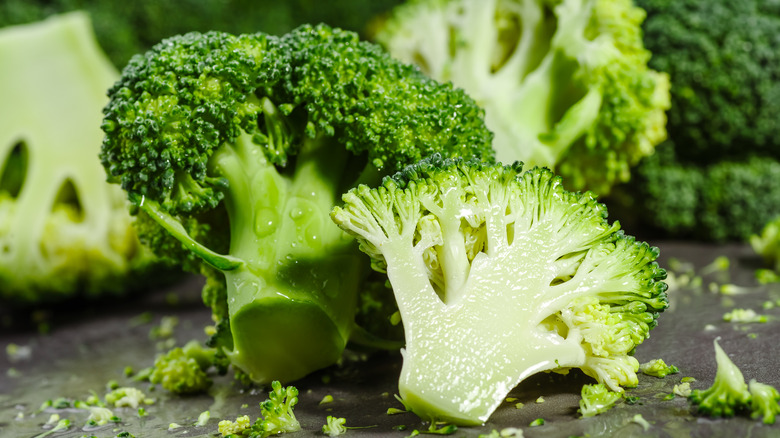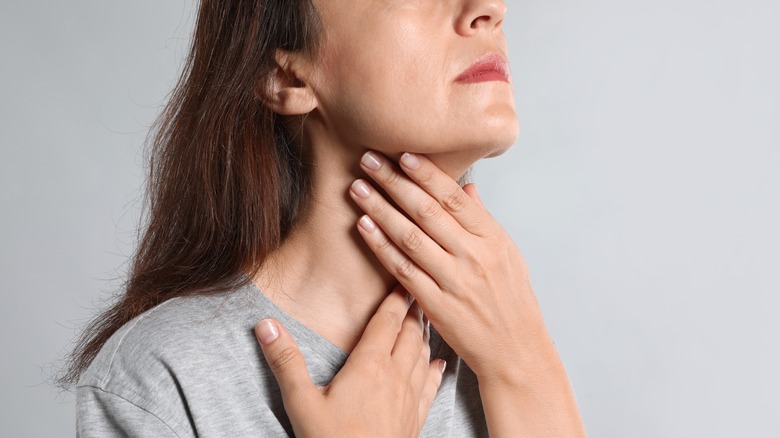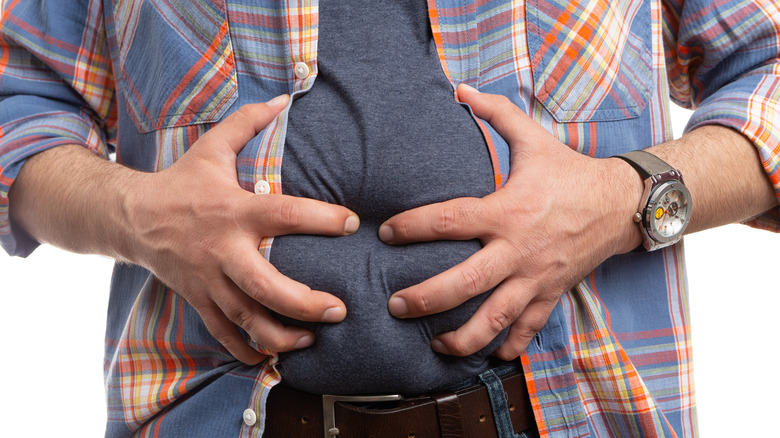This Is What Happens When You Eat Too Much Broccoli
Rich in vitamins and antioxidants, broccoli is considered a superfood. Like cabbage, kale, and other cruciferous veggies, it packs a hefty nutritional punch and fits into most diets. One serving (5.2 ounces) has just 50 calories and over 4 grams of plant-based protein, reports My Food Data. You'll also get 9.8 grams of carbs, including nearly 4 grams of fiber, plus large doses of vitamin C, calcium, phosphorus, potassium, and folate. Vitamin A, lycopene, lutein, zeaxanthin, and other antioxidants in broccoli protect against free radicals and strengthen your natural defenses.
For example, lutein and zeaxanthin support eye health may lower your risk of developing cataracts, according to the American Optometric Association. Vitamin C, one of the key nutrients in broccoli, may slow the progression of age-related macular degeneration, a condition that causes blurred vision. This vegetable is also a good source of sulforaphane, indole-3-carbinol, flavonoids, and other bioactive compounds with antioxidant and anti-inflammatory properties, per findings from a 2014 study published in Preventive Nutrition and Food Science.
While it can be tempting to eat broccoli daily or on most days, remember that more isn't always better. This cruciferous veggie is a nutritional powerhouse, but some of its constituents could harm your health when consumed in excess.
Eating too much broccoli could affect thyroid function
Cruciferous veggies, including broccoli, contain thiocyanate, progoitrin, and other compounds that may affect thyroid health. These naturally occurring chemicals could decrease iodine absorption, thereby reducing the production of thyroid hormone, according to research published in Nutrition Reviews. Scientists say that eating broccoli or other cruciferous vegetables in excess could put you at risk for hypothyroidism, a disorder characterized by unintentional weight gain, depression, fatigue, joint pain, and muscle aches (per WebMD).
However, these side effects are unlikely to occur following the consumption of typical serving sizes of broccoli, collard greens, bok choy, cabbage, and other vegetables in the brassica family. On top of that, cooking reduces the concentrations of glucosinolates — including thiocyanate, according to an earlier report featured in Human Toxicology. So, you can steam, boil, roast, or grill broccoli to activate myrosinase, an enzyme that destroys these compounds.
The downside is that most vegetables lose valuable nutrients when exposed to heat, notes the U.S. Department of Agriculture. Folate, thiamin, vitamin B6, vitamin C, and copper are the most vulnerable to degradation, especially when cooked in water. WebMD reports that broccoli can lose up to 97% of three key antioxidants if you microwave it in water for five minutes. Steaming, by comparison, has negligible effects on broccoli's nutritional value.
Broccoli can cause digestive discomfort
Have you ever experienced gas, bloating, or stomach pain after eating broccoli? As it turns out, most vegetables in the brassica family can cause digestive discomfort due to their high fiber content, says WebMD. The experts at Duke University warn that high-fiber diets are often to blame for diarrhea or constipation, cramping, and diminished appetite. Moreover, fiber can lead to mineral deficiencies when consumed in excess.
As mentioned earlier, broccoli provides nearly 4 grams of fiber per serving. If you eat 5–6 servings per day, that's an extra 20 to 24 grams of fiber. The recommended daily intake is 25 grams per day for women and 38 grams per day for men, points out Duke University. Depending on what your diet looks like, it's relatively easy to eat too much fiber. Your best bet is to watch your portions and increase your fiber intake gradually.
Also, note that eating too much broccoli can interfere with warfarin and other blood thinners (via Cleveland Clinic). This cruciferous veggie is rich in vitamin K, a nutrient that promotes blood clotting. The same goes for kale, spinach, collard greens, Swiss chard, and parsley. If you're taking blood thinners, you can still enjoy these foods as long as you don't go overboard.



